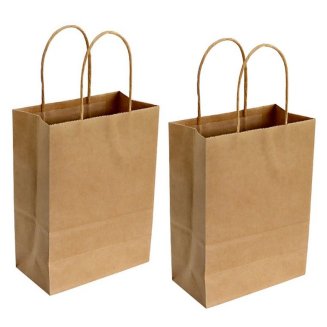
 Commerce's investigations concerning these nine countries cover paper shopping bags with handles of any type, whether printed or unprinted.
Commerce's investigations concerning these nine countries cover paper shopping bags with handles of any type, whether printed or unprinted.
May 21, 2024 (Press Release) - The Coalition for Fair Trade in Shopping Bags (the "Coalition") applauds the final determinations announced today by the United States Department of Commerce ("Commerce") that imports of paper shopping bags into the United States from Cambodia, China, Colombia, India, Malaysia, Portugal, Taiwan, and Vietnam are being sold at less than fair value (commonly termed "dumping") and that imports from China and India also are being subsidized. This follows an affirmative final finding of dumping announced in March with respect to imports of paper shopping bags from Turkey.
Commerce's investigations concerning these nine countries cover paper shopping bags with handles of any type, whether printed or unprinted. Paper shopping bags, which often are used to carry items purchased from a retail establishment or restaurant, typically are made of kraft paper but can be made from any type of paper material.
In its final determinations, Commerce concluded that imports of paper shopping bags from each of the nine countries are being unfairly traded. In particular, Commerce found combined dumping margins and subsidy rates of up to 308.13 percent. This means that U.S. importers of paper shopping bags from these countries will have to pay cash deposits to U.S. Customs and Border Protection ("Customs") based on the value of their future imports. For example, where a particular supplier has a dumping/subsidy rate of 60%, for every $100 of paper shopping bags imported from that supplier, importers will now have to begin paying $60 to U.S. Customs as cash deposits for future dumping duty liability.
An importer's final liabilities — which could be higher or lower than the cash deposits paid at the time of importation — will not be known for some time, however, since the cash deposits are only estimates. This means that the final duty assessments can be amended during Commerce's annual administrative reviews.
A summary of the country- and company-specific rates is available on Commerce's website.
The International Trade Commission ("ITC") already has determined that the U.S. industry is materially injured by reason of unfairly traded shopping bags imported from Turkey, and an antidumping duty order against Turkey was published on May 9. In mid-June, the ITC will vote on whether imports from Cambodia, China, Colombia, India, Malaysia, Portugal, Taiwan, and Vietnam have also caused injury. If the ITC reaches the same finding as it already has with respect to Turkey, Commerce will then issue additional antidumping and countervailing duty orders on July 8.
The Coalition is represented in these actions by the law firm King & Spalding LLP.
"The domestic manufacturing plants and U.S. workers greatly appreciate the hard work undertaken by Department of Commerce officials to evaluate the extent of unfair pricing practices from these countries," said Mike Taylor, a partner in the law firm of King & Spalding. "The dumping and subsidy findings validate the petitions that were filed last summer and should help restore fair competition to the U.S. market so that manufacturing plants and jobs can remain in the United States."
The Coalition intends actively to continue monitoring imports for unfairly traded paper shopping bags from other countries, and the Coalition also plans actively to coordinate with U.S. Customs to ensure that importers fully comply with their obligations. The importation of paper shopping bags from these nine countries without the payment of antidumping and countervailing cash deposits and duties may result in severe civil or criminal penalties.
King & Spalding is an international law firm that represents a broad array of clients, including half of the Fortune Global 100, with 1,300 lawyers in 24 offices in the United States, Europe, the Middle East and Asia.
SOURCE: King & Spalding
Paper Industry Newsletter
Stay on top of paper industry news
from around the world with
PaperAge's free weekly newsletter.
Delivered every Thursday.
Sign up today!